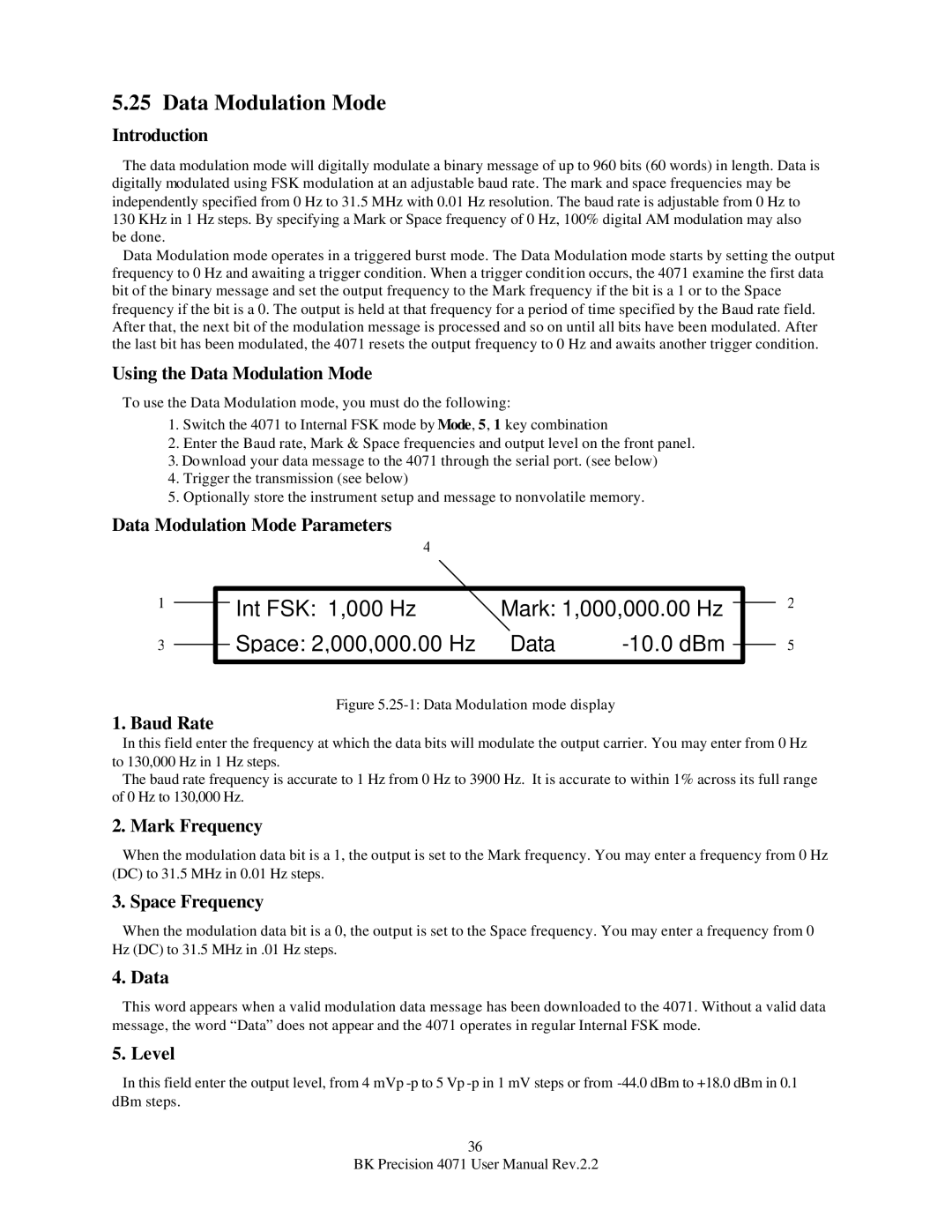
5.25 Data Modulation Mode
Introduction
The data modulation mode will digitally modulate a binary message of up to 960 bits (60 words) in length. Data is digitally modulated using FSK modulation at an adjustable baud rate. The mark and space frequencies may be independently specified from 0 Hz to 31.5 MHz with 0.01 Hz resolution. The baud rate is adjustable from 0 Hz to
130 KHz in 1 Hz steps. By specifying a Mark or Space frequency of 0 Hz, 100% digital AM modulation may also be done.
Data Modulation mode operates in a triggered burst mode. The Data Modulation mode starts by setting the output frequency to 0 Hz and awaiting a trigger condition. When a trigger condition occurs, the 4071 examine the first data bit of the binary message and set the output frequency to the Mark frequency if the bit is a 1 or to the Space frequency if the bit is a 0. The output is held at that frequency for a period of time specified by the Baud rate field. After that, the next bit of the modulation message is processed and so on until all bits have been modulated. After the last bit has been modulated, the 4071 resets the output frequency to 0 Hz and awaits another trigger condition.
Using the Data Modulation Mode
To use the Data Modulation mode, you must do the following:
1.Switch the 4071 to Internal FSK mode by Mode, 5, 1 key combination
2.Enter the Baud rate, Mark & Space frequencies and output level on the front panel.
3.Download your data message to the 4071 through the serial port. (see below)
4.Trigger the transmission (see below)
5.Optionally store the instrument setup and message to nonvolatile memory.
Data Modulation Mode Parameters
4
1 |
|
|
|
|
|
|
|
|
| Int FSK: 1,000 Hz | Mark: 1,000,000.00 Hz |
| |||
|
|
|
| ||||
|
|
| Space: 2,000,000.00 Hz | Data |
|
| |
3 |
|
|
|
| |||
|
|
|
| ||||
|
|
|
|
|
|
|
|
|
|
|
|
|
|
|
|
|
|
|
|
|
|
|
|
Figure 5.25-1: Data Modulation mode display
1. Baud Rate
2
5
In this field enter the frequency at which the data bits will modulate the output carrier. You may enter from 0 Hz to 130,000 Hz in 1 Hz steps.
The baud rate frequency is accurate to 1 Hz from 0 Hz to 3900 Hz. It is accurate to within 1% across its full range of 0 Hz to 130,000 Hz.
2. Mark Frequency
When the modulation data bit is a 1, the output is set to the Mark frequency. You may enter a frequency from 0 Hz (DC) to 31.5 MHz in 0.01 Hz steps.
3. Space Frequency
When the modulation data bit is a 0, the output is set to the Space frequency. You may enter a frequency from 0 Hz (DC) to 31.5 MHz in .01 Hz steps.
4. Data
This word appears when a valid modulation data message has been downloaded to the 4071. Without a valid data message, the word “Data” does not appear and the 4071 operates in regular Internal FSK mode.
5. Level
In this field enter the output level, from 4 mVp
36
BK Precision 4071 User Manual Rev.2.2
